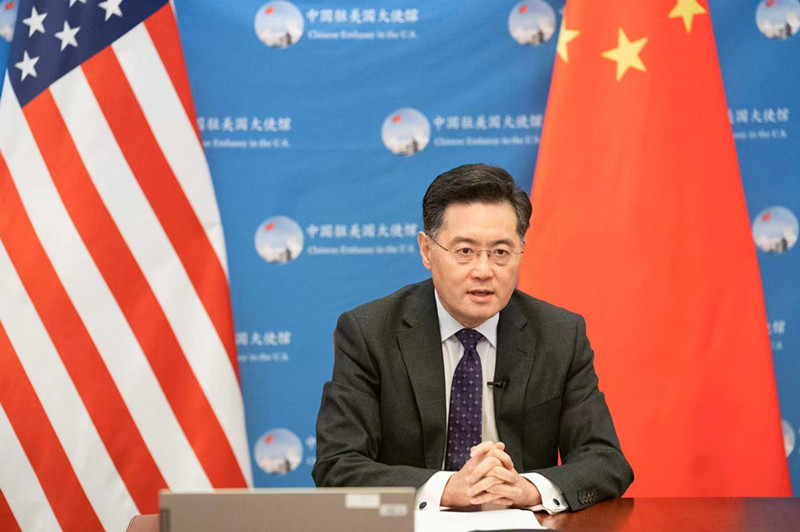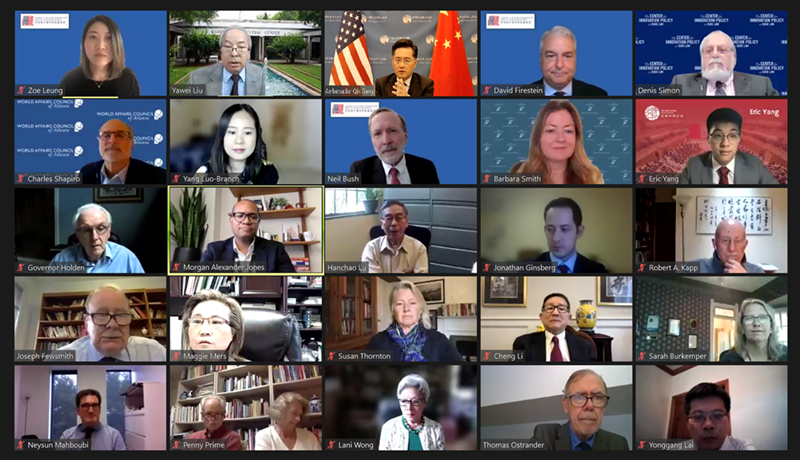Whole-process democracy: from the people, to the people, with the people, for the people
-- Amb. Qin Gang Attends the Conversation Held by The Carter Center and The Bush China Foundation
On September 22, 2021, Ambassador Qin Gang attended the online conversation jointly held by The Carter Center and The George H.W. Bush Foundation for US-China Relations and delivered a speech. Former US President Jimmy Carter and CEO of The Carter Center Paige Alexander sent a joint letter of congratulations to the event. Mr. Neil Bush, Chairman of The George H.W. Bush Foundation for US-China Relations, delivered remarks. Around 400 participants from various sectors of the US attended the conversation online. The event was broadcast live by CGTN.

Ambassador Qin spoke highly of the historic contributions made by Presidents Carter and George H. W. Bush to the development of China-US relations. He commended the efforts of The Carter Center and the Bush China Foundation to promote exchanges and cooperation between China and the US. He pointed out that thanks to generations of Chinese and American leaders and people, China-US relations have made remarkable progress. However, today, some Americans define America's relations with China as democracy versus authoritarianism, and try to stoke up ideological confrontation, which has led to serious difficulties in China-US relations.
Ambassador Qin pointed out that a basic criterion of democracy should be whether the people have the right to govern their country, whether their needs are met, and whether they have a sense of fulfillment and happiness. The idea of people first has been deep in the genes of the Chinese since ancient times. The Communist Party of China (CPC) was established with the mission to pursue happiness for the people. With the slogans of anti-dictatorship, anti-autocracy and anti-oppression, it enabled the people to become master of their own country and won the people's hearts. As the governing party, it has remained faithful to its founding mission: people-centered, and serving the people whole-heartedly. What China has today is whole-process democracy. The people have the right to election, and they can be broadly involved in national governance according to law. They exercise state power through the National People's Congress and local people's congresses at different levels. China also has a unique political consultation system and corresponding institutions, which are important ways for the people to exercise democracy. Any matters that concern people's keen interests are broadly discussed before major decisions are made to make sure what the people want are reflected in the final decisions. Most of the problems and conflicts of interests have been resolved and suggestions accepted in consultations, which also make implementation of the policies easier.
Ambassador Qin pointed out that in China, talents were chosen based on their abilities and merit since ancient times. A Chinese has to pass all kinds of exams in his or her lifetime. At work, there are additional trainings, assessments and selections, as well as oversight from superiors, colleagues, the public and the media. CPC members are also subject to Party disciplines, which are stricter than the law. The top leadership of China have all had long years of work experience from grassroots up to higher levels in different localities. As they rose through the ranks, they have got to know the people's kitchen table concerns. They deeply love the people, care about the people, and have become capable of managing complexities and getting things done for the people. At the same time, they are loved, trusted and supported by the people.
Ambassador Qin said, whether a system is democratic depends on whether it can represent the overall interests of the people and whether the people are satisfied. Whether it is good or not should not be judged by what we say, but what we do. When some people are busy fanning up the battle between democracy and authoritarianism, and putting together an alliance of democracies, absolute poverty has become a thing of the past in China, and 1.4 billion people are striving towards common prosperity. China has become the world's second largest economy and biggest trading nation, and contributes over 30% to global economic growth annually. Every day, 16,000 companies are created in China, and over 120 foreign enterprises are rushing to China, one of the biggest consumer markets and the top investment destination in the world. Almost every Chinese has basic medical insurance and old-age pension insurance. Products from remote areas are sold across the country through live streaming. Farmers in deep mountains and young people in cities take high-speed trains to look for jobs elsewhere and pursue their dreams. Green and low-carbon living has become a new fashion. The Chinese are driving 50% of the world's new-energy vehicles, on the biggest network of expressways in the world. 10% of the Chinese population have visited other countries to open up their eyes. Chinese astronauts have safely returned to Earth after several months' stay in our space station. The rights and freedoms of the Chinese are fully protected by the Constitution, and they are on their way to ballot stations. Muslims in Xinjiang and other places go to mosques nearby. One billion Chinese netizens get connected with the world for information and engagement at the click of a mouse. China has signed 26 international instruments on human rights. COVID-19 has been basically put under control in China, with 1.1 billion people fully vaccinated. China has provided vaccines to over 100 countries and international organizations, and will supply altogether two billion doses by the end of this year. The Belt and Road Initiative, guided by the principle of extensive consultation, joint contribution and shared benefits, will take tens of millions of people of other countries out of poverty. Over 2,400 Chinese peacekeepers are on duty worldwide. President Xi Jinping yesterday proposed a Global Development Initiative. China is working with other countries to build a community with a shared future for mankind.
Ambassador Qin pointed out that there are many difficulties and challenges on our way ahead. We are deepening reform, improving socialist democracy, and modernizing national governance. These efforts are to meet the people's aspiration for a better life and make greater contribution to mankind. China is pursuing peace, development, fairness, justice, democracy and freedom, which are common values of mankind. China's socialist whole-process democracy could be understood as this: from the people, to the people, with the people, for the people.
Ambassador Qin said, China and the US are different in history, culture and political system. But just as President Carter said, both the American and Chinese people desire peace and prosperity, and leaders in Washington and Beijing share one common goal: to create peaceful and stable conditions for their people to pursue happiness. This is the biggest commonality between China and the US. Our two countries should not and cannot change each other. Instead, we should break ideological barriers, discard zero-sum mentality, respect other countries, and accommodate each other without losing our own distinctions, so as to get along with each other in peace. President Xi stressed, "China and the United States need to show broad vision and shoulder great responsibilities. The two countries should look ahead and press forward, and bring China-US relations back to the right track of stable development as soon as possible, for the good of the people in both countries and around the world". Let's demonstrate strategic courage and political resolve to chart a new course in China-US relations.
Ambassador Qin also exchanged views with the audience on how China and the US can strengthen communication and dialogue, enhance mutual trust and cooperation, promote people-to-people exchanges, and respond to global challenges together, and what role China will play in economic integration of the Asia-Pacific.
President Carter and Mr. Bush said, the US-China relationship is the most important bilateral relationship in the world. Facing the new situation, the US and China should take a long-term vision, increase mutual understanding and trust through regular dialogue and communication, expand cooperation in various fields, and overcome the difficulties and challenges in bilateral relations so as to deliver more benefits to the two peoples and promote world peace and prosperity. The Carter Center and the Bush China Foundation will be committed to friendly exchanges between the US and China and play a positive role for the healthy and stable development of US-China relations.

- Top legislature schedules standing committee session for late February
- China's top legislator meets with Uruguayan president
- Senior legislator surveys Anhui on formulating outline of provincial 15th Five-Year Plan
- China's top legislator meets with British PM
- NPC deputies see more engagement with top court



